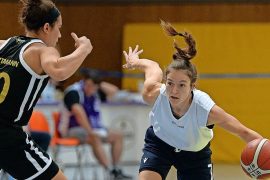Many can no longer hear the discussion that women’s football is not adequately rewarded, viewed in the media and especially financially. Nevertheless, it is imperative to tackle this topic, especially in the weeks following the European Championship. Because something will have to change in the long run so that you don’t lose touch completely compared to the nations.
From a sporting point of view, the European Championship was an absolute success for Germany with the runners-up title and this achievement should not be diminished in any way. In next year’s World Cup in Australia and New Zealand, however, the German team will face entirely different challenges with top nations such as Canada or the United States.
One look at the United States is enough to see what a high level of professionalism can achieve. Players like Dzsenifer Marozsán switched to the National Women’s Soccer League for a real challenge. “The league is different than in Europe. You are on the same level in America because every game is very hard. The league is so balanced and you never know who will win against whom,” said the German international in the documentary “Born for This”.
This is also reflected in visitor numbers, which range between 5,000 and 10,000, for example at Marozsson’s club OL Reign. In the Bundesliga, an average of 900 spectators come to the stadium. In the United States, women’s football enjoys a very high status and is at par with men in terms of the level of professionalism.
Structurally, the game is much further ahead than in Europe. Girls are encouraged early in the form of sports scholarships, professional training and strong financial support. There can be no question of this in the DFB, even though there has been open discussion between officials like Oliver Bierhoff and players like Sarah Dabritz or Almuth Schultz before EM. The premium was adjusted slightly for the European Championship, but the result was once again just another settlement.
Equality in football is still subject to conditions, although equality should be a condition, former international Tabiya Keme summed it up recently.
Regular reporting will start
When it comes to “equal pay” at the association level, Germany is long overdue to do the same thing as other countries, because basically commercial things are not of interest here. DFB is a registered association and hence non-profit, i.e. not dependent on profit.
If you break down the game, women play football just like men. It doesn’t help to hope that the enthusiasm for women’s football will last if you really have it in your hands.
It starts with regular reporting. Currently, the third division is still preferred to the Bundesliga. All Bundesliga games were broadcast via Magenta for the first time last season, but on a pay-TV platform that few people use.
[Mehr guten Sport aus lokaler Sicht finden Sie – wie auch Politik und Kultur – in unseren Leute-Newslettern aus den zwölf Berliner Bezirken. Hier kostenlos zu bestellen: leute.tagesspiegel.de]
Something has to happen within the league as well. Demanding a minimum wage, such as that of national player Lena Magal, is the perfect way to make the league more exciting. Currently, only players from Wolfsburg and Bayern can actually live on their salaries.
At least licensed clubs like Frankfurt or Hoffenheim would have to follow suit. Of course, smaller clubs such as SC Sand or SGS Essen cannot cope financially and rely on the support of the DFB.
Overall, the level within the league will rise and hold up compared to the English or Spanish leagues. This in turn will affect the DFB team and help prolong the World Cup in a year’s time so that you can play for the title again.

Web guru. Amateur thinker. Unapologetic problem solver. Zombie expert. Hipster-friendly travel geek. Social mediaholic.





